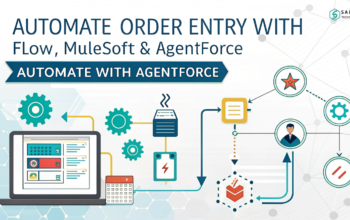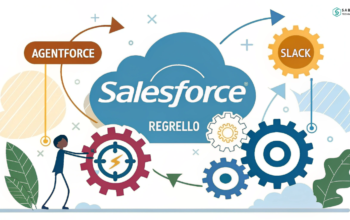Discover the real CRM comparison between Salesforce vs Dynamics 365 to help you choose the right CRM for your business in 2025.
Choosing the right CRM isn’t just about features anymore—it’s about choosing a long-term partner for your business growth. In today’s crowded landscape, Salesforce vs Dynamics 365 has become one of the most debated topics among CRM decision-makers. Both platforms have evolved, expanded their ecosystems, and promised to make customer relationships seamless.
But which one is genuinely right for your organization in 2025? Let’s dive deeper into this CRM comparison to help you decide with confidence.
Understanding the Basics of CRM Comparison
Before weighing Salesforce vs Dynamics 365, it’s important to get clear on what you truly need. CRM platforms aren’t just databases; they’re ecosystems that shape how your team interacts with leads, customers, and partners.
Both Salesforce and Dynamics 365 have carved impressive reputations. Salesforce, the longstanding leader, boasts unmatched customization. Meanwhile, Dynamics 365, backed by Microsoft, integrates naturally with tools many companies already use—like Excel and Outlook.
Now, let’s unravel their strengths and potential pitfalls.
Salesforce CRM: The Market Leader in the Salesforce vs Dynamics 365 Comparison
Salesforce didn’t earn its place at the top by accident. It offers a powerful mix of customization, automation, and third-party integrations. If your team values flexibility above all, Salesforce might just be your best ally.
Why choose Salesforce?
- Customization Freedom: Build workflows, dashboards, and apps tailored exactly to your needs.
- Rich AppExchange Ecosystem: Thousands of third-party apps enhance core CRM features.
- Strong Community Support: A global network of users and developers ready to help.
However, with great power comes complexity. New users often find Salesforce overwhelming without proper onboarding. Moreover, costs can escalate as you layer on more features.
Still, for businesses that need scalability with granular control, Salesforce remains hard to beat in this CRM comparison.
Dynamics 365: Seamless Integration for Microsoft-Centric Teams
If your business already runs on Microsoft, Dynamics 365 may feel like a natural fit. Its integration with familiar tools reduces learning curves and boosts productivity from the get-go.
What makes Dynamics 365 appealing?
- Native Microsoft Integration: Use CRM features within Teams, Outlook, and Excel.
- Modular System: Pick and choose apps—pay for only what you need.
- AI-Powered Insights: Tap into Microsoft’s AI engine for predictive analytics.
However, Dynamics 365’s flexibility doesn’t always match Salesforce’s breadth. Customization requires more technical support, and the ecosystem isn’t as expansive.
Still, when integration matters more than customization, Dynamics 365 wins points in this CRM comparison.
Salesforce vs Dynamics 365: CRM Comparison and Pricing Breakdown
Cost often tips the scales in Salesforce vs Dynamics 365 decisions. Salesforce’s plans typically start higher but offer more built-in customization. Dynamics 365, with its modular pricing, allows smaller companies to start light and expand later.
But beware of hidden costs. Add-ons, third-party apps, and training can increase expenses on both sides. Always map out not just today’s needs but also where your company plans to be in three to five years.
Which CRM Suits You in 2025?
Choosing between Salesforce and Dynamics 365 boils down to one thing: alignment with your business style.
- Go with Salesforce if you need deep customization, operate in a complex industry, or anticipate rapid scaling.
- Choose Dynamics 365 if you already rely heavily on Microsoft tools and prefer tight integration over full-scale customization.
No single CRM fits every scenario. That’s why careful, thoughtful CRM comparison matters more now than ever before.
Making the Right CRM Choice
In 2025, CRM decisions aren’t one-size-fits-all. The best move is the one that complements your workflows, supports your team, and drives long-term growth. Whether you lean toward Salesforce or Dynamics 365, both platforms offer tools capable of transforming how you engage customers.
Choose wisely, think long-term, and don’t forget that the right CRM is not just software—it’s a strategy.
The Salesforce vs Dynamics 365 debate in 2025 centers on customization versus integration. Salesforce wins for flexibility; Dynamics 365 triumphs for businesses immersed in the Microsoft ecosystem. Assess your business priorities, think strategically, and choose the CRM platform that fits your vision.
FAQs
1. Which CRM is easier to use, Salesforce or Dynamics 365?
Dynamics 365 tends to have a smoother learning curve for teams familiar with Microsoft products, while Salesforce offers more flexibility but requires deeper onboarding.
2. Can I migrate from Salesforce to Dynamics 365 easily?
Migration is possible but requires careful planning. Data structure differences can complicate direct transfers.
3. Which CRM is better for small businesses?
Small businesses often prefer Dynamics 365 due to its modular pricing, though Salesforce can be ideal for startups planning aggressive growth.
4. How do Salesforce and Dynamics 365 handle automation?
Salesforce excels in automation capabilities, while Dynamics 365 focuses more on native automation with Microsoft Power Platform integration.
5. Is Dynamics 365 more affordable than Salesforce?
Generally, Dynamics 365 starts at a lower cost, but pricing depends on selected modules and additional integrations.
Feeling more like puzzles than solutions? That’s when Sababa steps in.
At Sababa Technologies, we’re not just consultants, we’re your tech-savvy sidekicks. Whether you’re wrestling with CRM chaos, dreaming of seamless automations, or just need a friendly expert to point you in the right direction… we’ve got your back.
Let’s turn your moments into “Aha, that’s genius!”
Chat with our team or shoot us a note at support@sababatechnologies.com. No robots, no jargon, No sales pitches —just real humans, smart solutions and high-fives.
P.S. First coffee’s on us if you mention this blog post!



